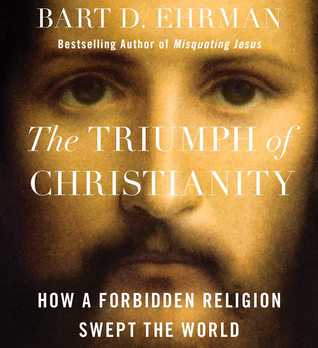The Triumph of Christianity: How A Forbidden Religion Swept the World by Bart D. Ehrman Audio Book: 10 hours, 18 min Hardback Book: 352 pages
There is a feeling of cynicism to this book. At times the author comes from a I like the ideas Jesus brought to the world similar to a Ghandi was a pretty cool guy, interpretation. Other times, the author is very adamant that he doesn’t believe many of the Christian precepts that Jesus and his disciples did not heal the sick, resurrect the dead nor drive demons out of people. It is a fact that if you ask a crowd of people what they just saw you will get as many different answers as there are people in the crowd you just asked. There may be some overlapping – the person had on a yellow shirt for instance but each person interprets what they see based on their own background experience. “He was tall,” “he was athletically built,” “he had amazing green eyes,” “he spoke with a speech impediment,” “I don’t know, the guy talked funny like he was nervous.” All equally true or embellished as the case may go, but, everyone saw the same thing, but, in their own way and their description will be based on their own experience or experiences and background. “He might have been Italian,” “He was probably Greek, maybe a Gypsy,” “I believe he was from the Middle East, his accent sounded Arabic.” We all see things our own way and in describing our perceptions may sound like our stories match within the group, or we or others may come off as being totally contradictory to one another, making one wonder, did we even see the same thing at all? It is the same with varying accounts down through history from those who were there to those who got the story through hearsay and have come to believe even though they were not necessarily there to witness first-hand. Ehrman’s writing dismisses people’s belief in many cases throughout the book, though, he gives a thoroughly researched account of the historical background on how Christianity spread throughout Europe and Africa. He notes little known points along the way – like that early Christians would often meet in cemeteries so they could talk freely about Jesus and His teachings and that the Roman Empire didn’t particularly persecute early Christians. Ehrman says the Romans didn’t particularly care who someone worshipped, as there were many different gods being offered sacrifices and being prayed to for intervention. The problem came in, he says, when the Jews or the newly formed Christian groups wouldn’t pay homage by bowing to whoever was in power politically, Caligula comes to mind first, – so- to be particularly violent in driving the point home that Roman emperors demanded to be worshipped as deities themselves, punishment was bitter, cruel and the accused were subject to local ridicule and used to frighten and entertain– ie. Circus Maximus. Amazing when you think of all the early endured to get to where it is today and how the teachings spread throughout the world, it boggles the mind. The Roman Emperor Constantine became known as the first Christian ruler over the Roman Empire, building churches, etc. though he was not baptized until on his deathbed – easier to keep from sinning that way he reasoned. Lots of good information both pro and con on Christianity here though the author’s bent is definetly agnostic toward atheism all-together. He holds up the historical records and dismisses tales of the Holy Spirit manifesting tongues of fire over the apostles heads on Pentecost. There is a lot of good information on how the Church spread out across the land from Jerusalem across the continents, I will be very interested to see if he has a sequel going further into history beginning with how the WORD was spread in the beginning up to current day. It was a little choppy not knowing if he was a believer just questioning everything or if he is leaning toward atheism with a total skeptic’s attitude. There are things to learn here though so I will praise the author for the compelling way he brings history to life even if a little unsettling in his assertion that lies were told. For those with a theological bent I would say this book is for you as it debates every issue giving you differing viewpoints on the bible and the history of the early evangelizers. I liked learning the facts this book taught but I think the author instead of presenting the information for the reader to make his or her own mind up about tends to poo poo belief and pushes really hard for the reader to come to Ehrman’s way of thinking. It’s like well believe what you want to but only his position is right. Yeah, we’ve heard that before, thank God they stopped serving the open minded and believers up to the lions for sport and entertainment.

No comments:
Post a Comment